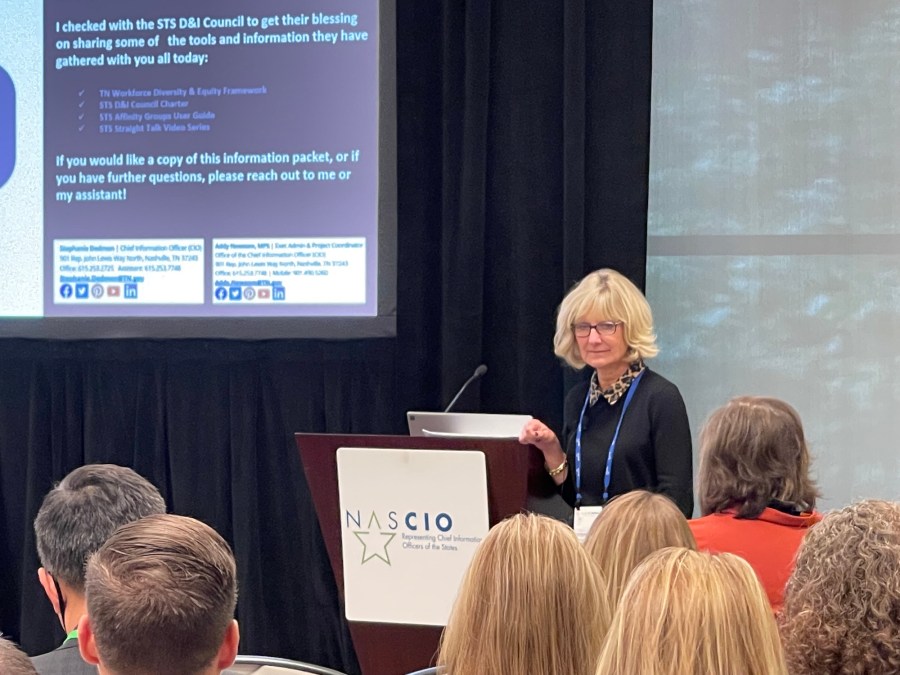How Tennessee embraced diversity in IT

Government IT has historically been dominated by white men, and like many organizations nationwide, Tennessee’s Strategic Technology Solutions agency contemplated its internal culture last year in the wake of the George Floyd protests.
The conversation inside the 1,200-person agency started shifting after two employees came up with the idea for an internal council to promote diversity and inclusion, Tennessee Chief Information Officer Stephanie Dedmon said Tuesday. During a session at the National Association of State Chief Information Officers annual conference in Seattle, Dedmon recalled how what began as an informal discussion developed into a 14-person group focused on making STS a more equitable place to work.
“Recruiting a diverse workforce is a challenge,” Dedmon said. “IT was for years and years predominantly a white male organization, whether that’s private or public sector. I think we have a way to go compared to our peer organizations.”
To support that, Dedmon last year supported the creation of a new Diversity and Inclusion Council. The idea was presented to her by Lawrence Sanders, a director of product delivery, and Todd Bartine, an IT resource director. In a video that Dedmon presented during her talk, Sanders, who is Black, and Bartine, who is white, said they presented their idea by noting that many corporate entities had developed diversity programs of their own, while state government lagged behind.
At the time Sanders and Bartine approached her, Dedmon recalled, the Tennessee Department of Human Resources, the state’s workforce bureau, had no such policy, nor did the Department of Finance and Administration, STS’ parent agency. But Dedmon soon got approval from her boss to form the council, she said.
The first step, she said, was for the new group to write a charter. Sanders and Bartine settled on five areas: recruitment, outreach, inclusion, communications and analytics. While the council’s work is still nascent, Dedmon said it’s beginning to make a difference.
“We’re removing intentional bias in our job descriptions,” she said, referring to phrases that may discourage certain candidates from applying. “One thing the team has brought forward is could we support people serving on advisory boards at colleges. It’s a chance to identify good candidates we might not know about.”
In addition to holding an agency-wide Diversity and Inclusion Month in October, the new council has started developing training courses, a data dashboard showing staff demographics and affinity groups for employees to join. The group also looks for volunteer opportunities, speaking engagements and mentorship programs.
Dedmon said she and STS’ other senior leaders meet with the council at least bimonthly. The group has also engaged with Nashville’s tech industry — Oracle has a major presence in the city — and local universities, including historically Black institutions. The overall goal, she said, is to make STS both a more appealing place to work and a better provider to the agencies and residents it supports.
“There is a correlation between increased IT effectiveness and IT’s involvement in diversity, equity and inclusion,” Dedmon said. “Improving diversity and inclusion does improve our culture. People want to feel they’re part of an organization that supports them, regardless of their background, race, gender other measures of a diverse workforce. Performance is increased. It expands customer representation and creates a sense of greater belonging.”
In the video, Sanders said that within three to five years, he’d like “the impact to be one where everyone feels valued and celebrated for what they bring to the table and celebrated for who they are.”
Still, change is slow, and STS’ council is an outlier among state IT agencies, though Dedmon said CIOs’ interest is growing. She said that while NASCIO’s 2020 member survey found only one CIO naming a diverse workforce a top priority, “nearly all” identified it this year. But when Dedmon asked the audience if their states had similar programs, just two hands went up.
One of those hands belonged to Ohio CIO Katrina Flory, who said said the Ohio Department of Administrative Services has a diversity, equity and inclusion program. She told StateScoop she’s seen change.
“I’ve been around for a while and I’ve been the only woman in the room,” Flory said. “That’s changed. I’ve seen a lot more diversity.”






